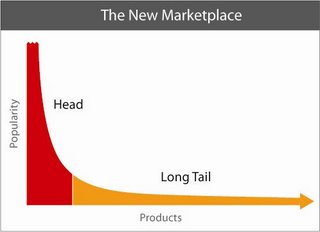The important points are that in the Internet age, storage and distribution costs are decreasing, there are all kinds of tools for customers to find niche businesses or niche products in your catalog, and you can amass a considerable number of customers by focusing on a niche (because you have a worldwide audience). Therefore the tail will continue to increase in size: the amount of business generated from highly specific services will continue to increase. What that means for you is that you can now get exactly what you want, highly tailored to your needs.
Well recently the WSJ disputed some of the theories with arguably loose evidence. The mathematicians have responded. Looks like mathemtatical analyses of Amazon and Netflix back up the theory with some simple logarithmic equations.
For example, Amazon attributes 60-80% of it's sales on it's top 100,000 titles. But let's flip that around. 20-40% of Amazon sales are from books that are not in the top 100,000!!! That's billions of dollars for books you can't find in most book stores.
It's the long tail and it's reshaping our world. All of a sudden the number of journalists will explode and most won't work for networks (blogs); you will be able to hear the music from any obscure band at any time (iTunes and piracy) and they will promote themselves (MySpace); and if you are a germaphobe and need a plastic banana cover or any other obscure thing, you will be able to find it (Google and the Internet). There will be complete TV stations with rich content wholly for cycling or sailing or whatever your hobby.
And it's happening now. Now that's freedom of choice.
